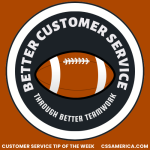
In the 7 Habits of Highly Effective People, Stephen Covey says that habits form at the intersection of desire, skills, and knowledge. Desire is the WANT TO do something. Skills is the HOW TO do something. Knowledge is a combination of the WHAT TO do and WHY TO do it.
Many of those who are best at serving others, who are best at customer service, have the desire to help others. They have the desire to meet a need, to resolve an issue, or to just engage people and do something for others.
In our professional lives, we hope to build our skill set, we go through training, watch webinars, read, and learn from co-workers and mentors to build our skill set.
To build our knowledge, we learn policies and procedures and people and places and products and services.
Understanding the Why
But the one area of this habit-forming approach that is often neglected – or at least not considered enough – is the “why to.”
And yet, the why to is often the most important thing. It notes the purpose of what we’re doing. It notes the potential benefit of our actions and our attitudes. It suggests the key reason for the habit we have or the habits we’re hoping to form.
So, think about the habits you have formed or want to form. Maybe it’s a habit of how you greet somebody or how and when you respond to messages. Maybe it’s a habit of how you plan or how you organize. Maybe it’s the mindset you take when you’re dealing with an angry customer. Maybe it’s a habit of who you share information with or who you don’t share information with in certain circumstances.
Now take a step back, and ask yourself the why question. Why do you greet people like you do? Why do you respond to messages the way you do and in the timeframe you do? Why do you plan or organize the way you do? What do you have a certain mindset when dealing with certain people? Why do you share information with some people but not other people?
If you want to change a habit, want to form a new habit, really want to improve the things you routinely do, the actions you routinely take, the attitudes you routinely have, then start with asking yourself why you’re doing those things today. By understanding yourself a little bit better and the reasons behind the habits, it’s easier to see whether and why you should change those behaviors.
To improve, understand why you do what you do.
Signup for FREE Tips! Contact Us More Resources for You Visit Our Home Page























